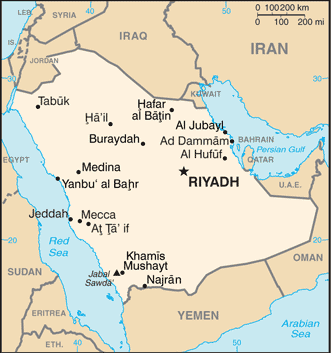 Washington, DC–(ENEWSPF)–February 24, 2015. The Department of State urges U.S. citizens to carefully consider the risks of traveling to Saudi Arabia. There have been recent attacks on U.S. citizens and other Western expatriates, an attack on Shi’ite Muslims outside a community center in the Eastern Province on November 3, 2014, and continuing reports of threats against U.S. citizens and other Westerners in the Kingdom. This replaces the Travel Warning issued August 8, 2014.
Washington, DC–(ENEWSPF)–February 24, 2015. The Department of State urges U.S. citizens to carefully consider the risks of traveling to Saudi Arabia. There have been recent attacks on U.S. citizens and other Western expatriates, an attack on Shi’ite Muslims outside a community center in the Eastern Province on November 3, 2014, and continuing reports of threats against U.S. citizens and other Westerners in the Kingdom. This replaces the Travel Warning issued August 8, 2014.
Security threats are increasing and terrorist groups, some affiliated with the Islamic State of Iraq and the Levant (ISIL) or Al-Qaida in the Arabian Peninsula (AQAP), have targeted both Saudi and Western interests. Possible targets include housing compounds, hotels, shopping areas, international schools, and other facilities where Westerners congregate, as well as Saudi government facilities and economic/commercial targets within the Kingdom.
On January 30, 2015, two U.S. citizens were fired upon and injured in Hofuf in Al Hasa Governorate (Eastern Province). The U.S. Embassy has instructed U.S. government personnel and their families to avoid all travel to Al Hasa Governorate, and advises all U.S. citizens to do the same. On October 14, 2014, two U.S. citizens were shot at a gas station in Riyadh. One was killed and the other wounded.
Attacks on other nationalities have increased. On November 29, 2014, a Canadian national was assaulted by a lone attacker with a cleaver at a shopping mall in Dhahran. On November 22, 2014, a Danish national was shot and injured in Riyadh by alleged ISIL supporters. On November 3, 2014, armed assailants attacked a community center in Dalwah in the Al Hasa Governorate, killing at least seven people and injuring several others. ISIL claimed responsibility for the attack. On the night of January 13, 2014, unknown gunmen attacked the vehicle of two German Embassy officials who were traveling through the Awamiyah section of the Al Qatif Governorate in the Eastern Province. U.S. government personnel are prohibited from traveling to Awamiyah, and we recommend private U.S. citizens avoid the area as well.
Armed assailants have attacked border checkpoints in the north and south. Two Saudi security forces were killed and one wounded during an attack on January 5, 2015 in Arar, along the border with Iraq. Further, on July 5, 2014, media reported that members of Al-Qaida attacked a border checkpoint between Yemen and Saudi Arabia on July 4, leading to the deaths of several of the attackers, as well as four members of the Saudi security forces. The rugged border area dividing Yemen and Saudi Arabia remains porous in some areas and portions are not clearly defined. U.S. government personnel are restricted from traveling within 50 miles of the border, which includes the cities of Jizan and Najran, without permission from Embassy security officials. Visitors, who choose to travel to these areas despite U.S. government concern, should be aware that terrorist and criminal elements may be operating there, including AQAP. U.S. citizens are strongly urged to read the Department of State Travel Warning for Yemen before traveling to areas near the Yemeni frontier.
U.S. citizens in Saudi Arabia are strongly encouraged to select hotels or housing compounds with careful attention to security measures and location. U.S. citizens should be aware of their surroundings at all times and are advised to keep a low profile; vary times and routes of travel; exercise caution while driving, and entering or exiting vehicles; and ensure that travel documents and visas are current and valid.
If the security threat changes or specific threats affecting U.S. citizens are discovered, this information will be made available through the Smart Traveler Enrollment Program (STEP) and U.S. Mission websites. Emergency Messages, Security Messages, and Messages for U.S. Citizens can be found on the U.S. Embassy Riyadh website.
The Department of State encourages U.S. citizens living overseas or planning to travel abroad to enroll in the Smart Traveler Enrollment Program (STEP). By enrolling, U.S. citizens make it easier for the Embassy to contact them in case of emergency. U.S. citizens without internet access may enroll directly with the U.S. Embassy in Riyadh or the Consulates General in Dhahran or Jeddah.
U.S. Embassy Riyadh
Telephone: (966) (11) 488-3800
Fax: (966) (11) 483-0773
Emergency after-hours telephone: (966) (11) 488-3800
U.S. Consulate General Dhahran
Telephone: (966) (13) 330-3200
Fax: (966) (13) 330-0464
Emergency after-hours telephone: (966) (13) 330-3200
U.S. Consulate General Jeddah
Telephone: (966) (12) 667-0080
Fax: (966) (12) 669-3098
Emergency after-hours telephone: (966) (12) 667-0080
Up-to-date information on travel and security can also be obtained by calling 1-888-407-4747 toll-free in the United States and Canada or, for callers from other countries, on a regular toll line at 1-202-501-4444. These numbers are available from 8:00 a.m. to 8:00 p.m. Eastern Daylight Time, Monday through Friday (except U.S. federal holidays).
Stay up to date by bookmarking our Bureau of Consular Affairs website, which contains the current Travel Warnings and Travel Alerts as well as the Worldwide Caution. Follow us on Twitter and the Bureau of Consular Affairs page on Facebook as well.
Source: state.gov








